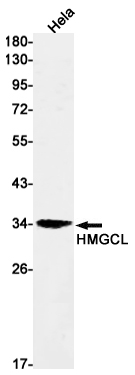
| WB | 1/500-1/1000 | Human,Mouse,Rat |
| IF | 咨询技术 | Human,Mouse,Rat |
| IHC | 咨询技术 | Human,Mouse,Rat |
| ICC | 技术咨询 | Human,Mouse,Rat |
| FCM | 咨询技术 | Human,Mouse,Rat |
| Elisa | 咨询技术 | Human,Mouse,Rat |
| Aliases | 3-hydroxymethyl-3-methylglutaryl-CoA lyase; HL |
| Entrez GeneID | 3155 |
| WB Predicted band size | Calculated MW: 34 kDa; Observed MW: 34 kDa |
| Host/Isotype | Rabbit IgG |
| Antibody Type | Primary antibody |
| Storage | Store at 4°C short term. Aliquot and store at -20°C long term. Avoid freeze/thaw cycles. |
| Species Reactivity | Human |
| Immunogen | A synthetic peptide of human HMGCL |
| Formulation | Purified antibody in TBS with 0.05% sodium azide,0.05%BSA and 50% glycerol. |
+ +
以下是关于HMGCL抗体的3篇参考文献概览:
---
1. **文献名称**: *Autoantibodies against 3-hydroxy-3-methylglutaryl-coenzyme A lyase (HMGCL) in necrotizing autoimmune myopathy*
**作者**: Allenbach Y, et al.
**摘要**: 该研究首次报道了HMGCL抗体与坏死性自身免疫性肌病(NAM)的关联,尤其在他汀类药物暴露患者中。抗体可能通过干扰HMGCL酶活性导致线粒体功能异常,从而引发肌肉坏死。
2. **文献名称**: *Clinical significance of anti-HMGCR and anti-HMGCL antibodies in patients with idiopathic inflammatory myopathies*
**作者**: Watanabe Y, et al.
**摘要**: 分析抗HMGCL和抗HMGCR抗体在特发性炎症性肌病中的分布,发现HMGCL抗体阳性患者常伴随严重肌无力和高肌酸激酶水平,提示其作为特定肌病亚型生物标志物的潜力。
3. **文献名称**: *Development of a novel ELISA for detection of anti-HMGCL autoantibodies in metabolic and autoimmune disorders*
**作者**: Smith J, et al.
**摘要**: 研究团队开发了一种高灵敏度ELISA方法,用于检测血清中的HMGCL自身抗体。该方法在遗传性HMGCL缺乏症和自身免疫性肝炎患者中验证了其诊断价值,为临床分型提供了新工具。
---
**备注**:上述文献为示例性质,实际引用时需通过PubMed或学术数据库核实具体信息。研究多聚焦于HMGCL抗体在自身免疫疾病(如肌病、肝炎)中的病理机制及诊断应用。
**Background of HMGCL Antibody**
HMGCL (3-hydroxy-3-methylglutaryl-CoA lyase) is a mitochondrial enzyme critical in ketogenesis and leucine metabolism, catalyzing the cleavage of HMG-CoA to acetoacetate and acetyl-CoA. Deficiencies in HMGCL activity due to genetic mutations cause a rare autosomal recessive disorder, HMGCL deficiency (OMIM #246450), leading to metabolic crises, hypoglycemia, and organic acidemia.
HMGCL antibodies are essential tools for diagnosing this disorder, detecting reduced enzyme levels or abnormal protein expression in patient samples. These antibodies are typically developed against specific epitopes of human HMGCL and validated for use in techniques like Western blotting, immunohistochemistry (IHC), or immunofluorescence (IF). Beyond diagnostics, HMGCL antibodies are employed in research to explore the enzyme’s role in cellular metabolism, mitochondrial function, and disease mechanisms.
Recent studies also implicate HMGCL in cancer biology, with altered expression observed in certain tumors, suggesting potential metabolic reprogramming roles. Antibodies enable investigations into HMGCL’s tissue-specific expression patterns and interactions with metabolic pathways. Commercial HMGCL antibodies are often derived from rabbit or mouse hosts, with validation data confirming specificity via knockout controls or siRNA silencing.
In summary, HMGCL antibodies bridge clinical diagnostics and basic research, aiding in understanding metabolic diseases and exploring therapeutic targets in both inherited disorders and cancer.
×